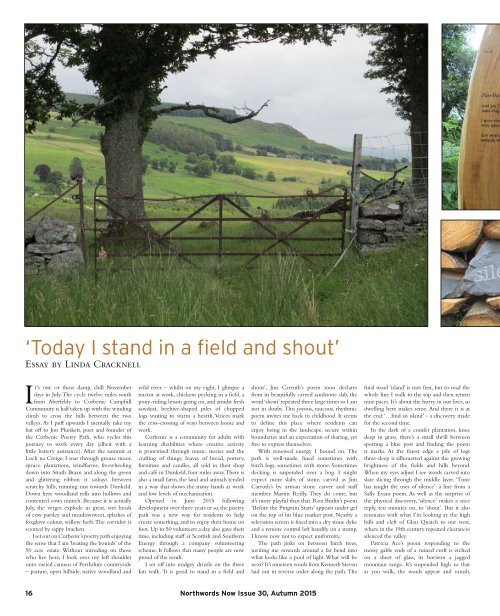Northwords Now
7c35eT
7c35eT
Create successful ePaper yourself
Turn your PDF publications into a flip-book with our unique Google optimized e-Paper software.
‘Today I stand in a field and shout’<br />
Essay by Linda Cracknell<br />
It’s one of those damp, chill November<br />
days in July. The cycle twelve miles south<br />
from Aberfeldy to Corbenic Camphill<br />
Community is half taken up with the winding<br />
climb to cross the hills between the two<br />
valleys. As I puff upwards I mentally take my<br />
hat off to Jon Plunkett, poet and founder of<br />
the Corbenic Poetry Path, who cycles this<br />
journey to work every day (albeit with a<br />
little battery assistance). After the summit at<br />
Loch na Creige, I soar through grouse moor,<br />
spruce plantations, windfarms, freewheeling<br />
down into Strath Braan and along the green<br />
and glittering ribbon it sashays between<br />
scratchy hills, running east towards Dunkeld.<br />
Down here woodland rolls into hollows and<br />
contented cows munch. Because it is actually<br />
July, the verges explode in great, wet heads<br />
of cow parsley and meadowsweet, splashes of<br />
foxglove colour, willow herb. The corridor is<br />
scented by sappy bracken.<br />
I set out on Corbenic’s poetry path enjoying<br />
the sense that I am ‘beating the bounds’ of the<br />
50 acre estate. Without intruding on those<br />
who live here, I look over my left shoulder<br />
onto varied cameos of Perthshire countryside<br />
– pasture, open hillside, native woodland and<br />
wild river – whilst on my right, I glimpse a<br />
tractor at work, chickens pecking in a field, a<br />
pony-riding lesson going on, and amidst fresh<br />
sawdust, beehive-shaped piles of chopped<br />
logs waiting to warm a hearth. Voices mark<br />
the criss-crossing of ways between home and<br />
work.<br />
Corbenic is a community for adults with<br />
learning disabilities where creative activity<br />
is prioritised through music, stories and the<br />
crafting of things; loaves of bread, pottery,<br />
furniture and candles, all sold in their shop<br />
and café in Dunkeld, four miles away. There is<br />
also a small farm, the land and animals tended<br />
in a way that shows the many hands at work<br />
and low levels of mechanisation.<br />
Opened in June 2015 following<br />
development over three years or so, the poetry<br />
path was a new way for residents to help<br />
create something, and to enjoy their home on<br />
foot. Up to 50 volunteers a day also gave their<br />
time, including staff at Scottish and Southern<br />
Energy through a company volunteering<br />
scheme. It follows that many people are now<br />
proud of the result.<br />
I set off into midgey drizzle on the three<br />
km walk. ‘It is good to stand in a field and<br />
shout’, Jim Carruth’s poem soon declares<br />
from its beautifully carved sandstone slab, the<br />
word ‘shout’ repeated three large times so I am<br />
not in doubt. This joyous, raucous, rhythmic<br />
poem invites me back to childhood. It seems<br />
to define this place where residents can<br />
enjoy being in the landscape, secure within<br />
boundaries and an expectation of sharing, yet<br />
free to express themselves.<br />
With renewed energy I bound on. The<br />
path is well-made, lined sometimes with<br />
birch logs, sometimes with stone. Sometimes<br />
decking is suspended over a bog. I might<br />
expect more slabs of stone, carved as Jim<br />
Carruth’s by artisan stone carver and staff<br />
member Martin Reilly. They do come, but<br />
it’s more playful than that. Ron Butlin’s poem<br />
‘Before the Program Starts’ appears under gel<br />
on the top of his blue marker post. Nearby a<br />
television screen is fixed into a dry stone dyke<br />
and a remote control left handily on a stump.<br />
I know now not to expect uniformity.<br />
The path jinks on between birch trees,<br />
inviting me onwards around a far bend into<br />
what looks like a pool of light. What will be<br />
next? It’s nineteen words from Kenneth Steven<br />
laid out in reverse order along the path. The<br />
final word ‘island’ is met first, but to read the<br />
whole line I walk to the top and then return<br />
nine paces. It’s about the hurry in our lives, so<br />
dwelling here makes sense. And there it is at<br />
the end: ‘…find an island’ – a discovery made<br />
for the second time.<br />
In the dark of a conifer plantation, knee<br />
deep in grass, there’s a small thrill between<br />
spotting a blue post and finding the poem<br />
it marks. At the forest edge a pile of logs<br />
three-deep is silhouetted against the growing<br />
brightness of the fields and hills beyond.<br />
When my eyes adjust I see words carved into<br />
slate slicing through the middle layer. ‘Time<br />
has taught the uses of silence’: a line from a<br />
Sally Evans poem. As well as the surprise of<br />
the physical discovery, ‘silence’ makes a nice<br />
reply, ten minutes on, to ‘shout’. But it also<br />
resonates with what I’m looking at: the high<br />
hills and cleft of Glen Quaich to our west,<br />
where in the 19th century repeated clearances<br />
silenced the valley.<br />
Patricia Ace’s poem responding to the<br />
mossy gable ends of a ruined croft is etched<br />
on a sheet of glass, its horizon a jagged<br />
mountain range. It’s suspended high so that<br />
as you walk, the words appear and vanish,<br />
16<br />
<strong>Northwords</strong> <strong>Now</strong> Issue 30, Autumn 2015


